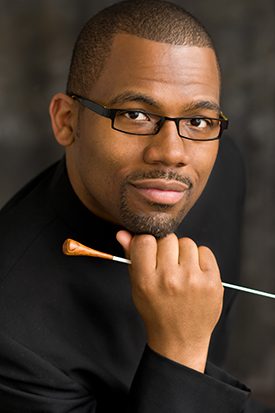In virtual debut, Rogers leads Washington Chorus in Covid-inspired premiere

The Washington Chorus and its new director, Eugene Rogers, faced a dilemma over the summer. The coronavirus pandemic had forced the cancellation of the end of one season and seemed poised to do the same to the next season. Rogers, who continues in his other job as director of choral activities at the University of Michigan, pivoted the choir toward the commission of a new piece to open the fall season virtually. As a way to celebrate the 60th anniversary of the Washington Chorus and the opening concert by its first black music director, it seemed like a promising project.
The result, Cantata for a More Hopeful Tomorrow, is a filmed musical performance, streamed for the first time Saturday night. The 30-minute film, directed by Bob Berg, tells the story of an older black couple, Martin and Michelle Rogers. Martin is diagnosed with Covid-19 and Michelle returns home, unable to stay with her husband in the hospital. She makes a photo album and mixtape to lift Martin’s spirits, leading to an upbeat outcome.
Damien Geter, a baritone and composer based in Portland, drew upon Bach’s Cantata No. 12, Weinen, Klagen, Sorgen, Zagen, for both musical and formal inspiration. Geter’s five-part work opens with a close adaptation of the first choral movement from that cantata, with additional choral parts doubling Bach’s instrumental lines. The ground bass line that underpins that music returns in some of Geter’s later movements as well.
More broadly, Geter follows the emotional trajectory of Bach’s work, moving from F minor with an ominous F pedal sustained through the second movement toward the sunny relative major key of A-flat major in the fifth movement. Geter’s most effective passages incorporate the sounds of African-American spirituals, “I Want Jesus to Walk with Me” in the second movement and especially “There Is a Balm in Gilead” in the fourth.
Much of the performance was difficult to judge. The recording of the musical performances was all done remotely by chorus members singing at home. These individual voices were layered together, in a digital sleight of hand that has become all too familiar during the months of the pandemic. It can create a more or less convincing simulacrum of a small vocal ensemble together, but it fell short of capturing the sound of a hundred people singing in a hall.
The film sometimes drew focus away from the music, too, especially in the first movement, as the voiceovers of newscasters were heard over the musicians. This was happily not the case when soprano Aundi Marie Moore joined in the first spiritual, her vivid, rich voice intertwining sinuously with the plangent riffs played by cellist Seth Parker Woods.
Moore, familiar to local audiences from her time in Washington National Opera’s Cafritz Young Artists program, brought extraordinary vocal beauty and uplifting physical presence to the solo part. This is all the more remarkable as she remembered recording it in a pantry in her house. “I had soup cans next to me,” she recollected in a post-performance video chat. “Nothing glamorous about it!”
Still, the project overall seemed thin and disappointing. As with almost all such digital performances, sewn together on editing software, the conductor is replaced by a click track. At only one point did Rogers himself appear in the film. As Martin Rogers was shown recovering in the fifth movement, he stood up and was transformed into Eugene Rogers, conducting members of the Washington Chorus, echoing pictures of the conductor placed into the photo album by Michelle Rogers.
Selected members of the Washington Chorus were filmed in front of a green screen, one by one, lip-synching their parts. These individual video clips were incorporated into the film in slightly awkward ways, sometimes appearing on Michelle’s television screen but also hovering in the air with other digital effects. The project admirably draws attention to the devastating effects of the coronavirus on the black community, including here in Washington, but too often does so in a cloying, sentimental fashion.
The film is available to stream through December 1. thewashingtonchorus.org


